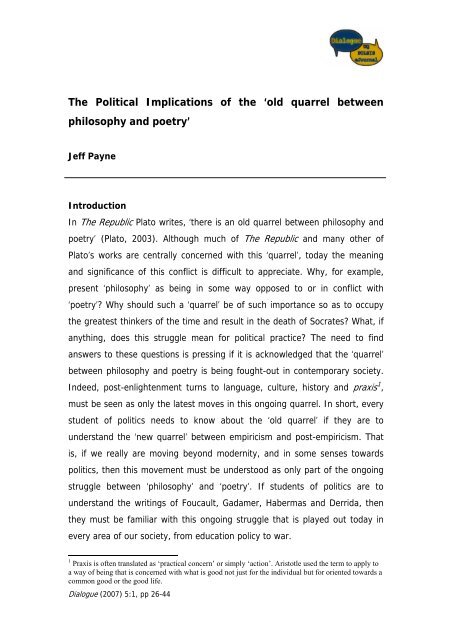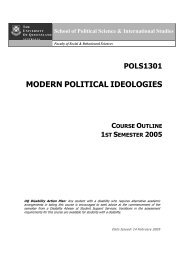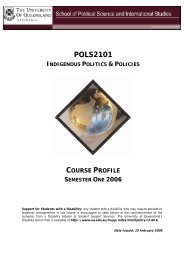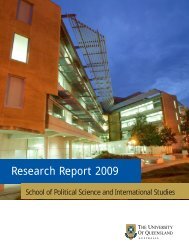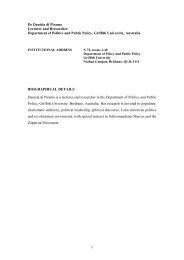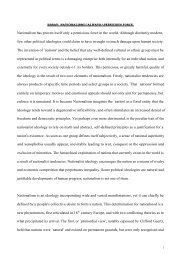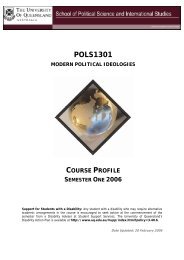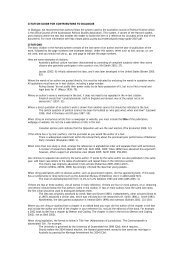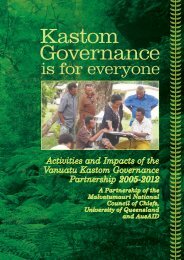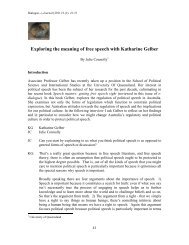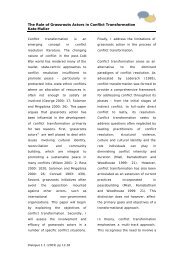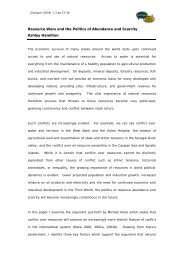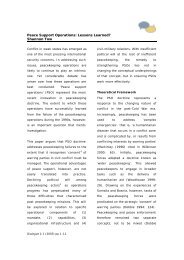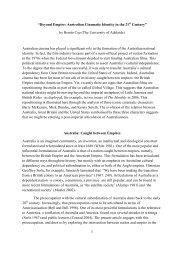old quarrel between - School of Political Science and International ...
old quarrel between - School of Political Science and International ...
old quarrel between - School of Political Science and International ...
You also want an ePaper? Increase the reach of your titles
YUMPU automatically turns print PDFs into web optimized ePapers that Google loves.
The <strong>Political</strong> Implications <strong>of</strong> the ‘<strong>old</strong> <strong>quarrel</strong> <strong>between</strong><br />
philosophy <strong>and</strong> poetry’<br />
Jeff Payne<br />
Introduction<br />
In The Republic Plato writes, ‘there is an <strong>old</strong> <strong>quarrel</strong> <strong>between</strong> philosophy <strong>and</strong><br />
poetry’ (Plato, 2003). Although much <strong>of</strong> The Republic <strong>and</strong> many other <strong>of</strong><br />
Plato’s works are centrally concerned with this ‘<strong>quarrel</strong>’, today the meaning<br />
<strong>and</strong> significance <strong>of</strong> this conflict is difficult to appreciate. Why, for example,<br />
present ‘philosophy’ as being in some way opposed to or in conflict with<br />
‘poetry’? Why should such a ‘<strong>quarrel</strong>’ be <strong>of</strong> such importance so as to occupy<br />
the greatest thinkers <strong>of</strong> the time <strong>and</strong> result in the death <strong>of</strong> Socrates? What, if<br />
anything, does this struggle mean for political practice? The need to find<br />
answers to these questions is pressing if it is acknowledged that the ‘<strong>quarrel</strong>’<br />
<strong>between</strong> philosophy <strong>and</strong> poetry is being fought-out in contemporary society.<br />
Indeed, post-enlightenment turns to language, culture, history <strong>and</strong> praxis 1 ,<br />
must be seen as only the latest moves in this ongoing <strong>quarrel</strong>. In short, every<br />
student <strong>of</strong> politics needs to know about the ‘<strong>old</strong> <strong>quarrel</strong>’ if they are to<br />
underst<strong>and</strong> the ‘new <strong>quarrel</strong>’ <strong>between</strong> empiricism <strong>and</strong> post-empiricism. That<br />
is, if we really are moving beyond modernity, <strong>and</strong> in some senses towards<br />
politics, then this movement must be understood as only part <strong>of</strong> the ongoing<br />
struggle <strong>between</strong> ‘philosophy’ <strong>and</strong> ‘poetry’. If students <strong>of</strong> politics are to<br />
underst<strong>and</strong> the writings <strong>of</strong> Foucault, Gadamer, Habermas <strong>and</strong> Derrida, then<br />
they must be familiar with this ongoing struggle that is played out today in<br />
every area <strong>of</strong> our society, from education policy to war.<br />
1 Praxis is <strong>of</strong>ten translated as ‘practical concern’ or simply ‘action’. Aristotle used the term to apply to<br />
a way <strong>of</strong> being that is concerned with what is good not just for the individual but for oriented towards a<br />
common good or the good life.<br />
Dialogue (2007) 5:1, pp 26-44
In this article I will show that the historical, <strong>and</strong> apparently transient, victory<br />
<strong>of</strong> philosophy over poetics is the most important political event in history. This<br />
conclusion, <strong>of</strong> course, suggests that there is much more at stake in the<br />
<strong>quarrel</strong> <strong>between</strong> ‘philosophy’ <strong>and</strong> ‘poetry’ than simply a style <strong>of</strong> writing.<br />
Indeed, I hope to show that the political portrayal <strong>of</strong> poiesis 2 itself, as<br />
exhaustively manifested in ‘poetry’, was only an aspect <strong>of</strong> an attempt to close<br />
<strong>of</strong>f the domain <strong>of</strong> potential 3 . What is achieved with the victory <strong>of</strong> philosophy<br />
over poetics, significantly progressed through the work <strong>of</strong> Plato <strong>and</strong> later<br />
Aristotle, is the prioritizing <strong>of</strong> ‘knowledge’ over ‘imagination’, ‘actuality’ over<br />
‘potential’, ‘presence’ over ‘presencing’, <strong>and</strong> ‘being’ over ‘becoming’. In short<br />
what is achieved with the victory <strong>of</strong> philosophy is the beginning <strong>of</strong> the<br />
western ‘metaphysical’ tradition which, Derrida identifies, as ‘the<br />
determination <strong>of</strong> being as . . . the constant <strong>of</strong> a presence – eidos, arche,<br />
telos, energeia, ousia (essence, existence, substance, subject) aletheia,<br />
transcendentality, consciousness, or conscience, God, man, <strong>and</strong> so forth”<br />
(Derrida, 1981: 249). This trajectory closes <strong>of</strong>f the domain <strong>of</strong> politics, the<br />
region <strong>of</strong> truly critical analysis, <strong>and</strong> the possibility for seeing innovation. The<br />
need for underst<strong>and</strong>ing, in adequate terms, the nature <strong>of</strong> the <strong>quarrel</strong> <strong>between</strong><br />
philosophy <strong>and</strong> poetry is one <strong>of</strong> the most important lessons that students <strong>of</strong><br />
politics can learn. Simply put, what is at stake in this struggle is, quite<br />
literally, everything. That is, everything is revealed in particular ways,<br />
theoretically, in practice, in production, <strong>and</strong> what is at stake is how<br />
2 Poiesis is a highly contested word that is <strong>of</strong>ten translated as ‘production’ or ‘poetic’. The pre-Socratic<br />
meaning, Heidegger suggests, is that it is a ‘bringing-forth’ from not being to being. Plato, in The<br />
Symposium, also suggests that poiesis used to be understood more broadly than merely the ‘poetic’.<br />
Throughout this text this word will take on different meanings depending on how it is deployed. This<br />
re-contextualisation <strong>of</strong> the word is itself ‘poetic’.<br />
3 Potential or dunamis is, once again, a hotly contested term <strong>and</strong> one central to the debate introduced in<br />
this work. Aristotle introduces the distinction in the aftermath <strong>of</strong> Plato’s criticisms <strong>of</strong> the ‘poets’ as a<br />
default position in opposition to energeia or actuality or activity. The sense used in Aristotle is that <strong>of</strong><br />
eyes having the potential to ‘see’ but when they are ‘seeing’, in the activity <strong>of</strong> seeing, then they are<br />
being ‘actually’ what they are. Marx uses these terms in the sense <strong>of</strong> something being only potentially<br />
this or that but in practice it becomes actually what it is.<br />
Dialogue (2007) 5:1 27
everything, the environment, others, <strong>and</strong> even ourselves, understood as such,<br />
are at stake in the struggle <strong>between</strong> philosophy <strong>and</strong> poetry.<br />
More than a matter <strong>of</strong> style but a way <strong>of</strong> ‘disclosure’<br />
It is important to emphasize from the outset that there is much more at stake<br />
in the <strong>quarrel</strong> <strong>between</strong> ‘poetics’ <strong>and</strong> ‘philosophy’ than some contemporary<br />
sense <strong>of</strong> ‘style’ or ‘form’ <strong>of</strong> writing. The distinction <strong>between</strong> ‘poetry’ <strong>and</strong><br />
‘philosophy’ is not the same as the formal distinctions today <strong>between</strong> ‘essay<br />
writing’ <strong>and</strong> ‘journalism’ or <strong>between</strong> a ‘scientific report’ <strong>and</strong> ‘creative prose’. It<br />
is, therefore, correct to think <strong>of</strong> the nature <strong>of</strong> the struggle <strong>between</strong><br />
philosophy <strong>and</strong> poetry as being concerned in one sense with ‘style’ (lexis), as<br />
evidenced by Plato’s account <strong>of</strong> style in The Republic when he writes, “We<br />
must next deal with its style <strong>of</strong> presentation, <strong>and</strong> so cover both what is to be<br />
said <strong>and</strong> how it is to be said” (Plato, 2003: 392c6), but this ‘style’, as I hope<br />
to show, is concerned with the way the world is shown to be through the<br />
accounts being given <strong>and</strong> where authority <strong>and</strong> legitimacy for these accounts<br />
rest. The meaning <strong>of</strong> ‘style’ being used here is more like the sense <strong>of</strong> ‘style’<br />
when we speak <strong>of</strong> ‘styles’ <strong>of</strong> clothing or ‘fashion’. That is, things are shown<br />
according to ‘fashion’, in the dual sense <strong>of</strong> this word, as both a ‘shaping’ <strong>and</strong><br />
‘style’ (Agamben, 1999: 194-195). With the event <strong>of</strong> a new ‘fashion’ in<br />
clothing things take on a different appearance, for example, what is ‘ugly’ or<br />
‘stylish’ is understood differently in light <strong>of</strong> the new ‘style’. Different<br />
authorities will be raised <strong>and</strong> <strong>old</strong> authorities will be questioned <strong>and</strong> even<br />
forgotten. It is this sense <strong>of</strong> ‘style’ or ‘fashion’ that is most characteristic <strong>of</strong><br />
the struggle <strong>between</strong> philosophy <strong>and</strong> poetry.<br />
There is a danger in drawing an analogy <strong>between</strong> the shift in world disclosure<br />
<strong>and</strong> changes in styles <strong>of</strong> clothing. With such flippant analogies the significance<br />
<strong>of</strong> this ‘<strong>quarrel</strong>’ may be lost. As the trial <strong>and</strong> sentencing <strong>of</strong> Socrates proves,<br />
people were prepared to kill <strong>and</strong> die to achieve their aims in this struggle as<br />
Dialogue (2007) 5:1 28
they recognized it was a struggle for not only the ‘future’ but the ‘past’ <strong>and</strong><br />
the ‘present’. The importance <strong>of</strong> the temporary victory <strong>of</strong> philosophy over<br />
poetry is confirmed every time Socrates, Plato <strong>and</strong> Aristotle are listed as the<br />
greatest thinkers in history. If we underst<strong>and</strong> the victory <strong>of</strong> philosophy as the<br />
dominant ‘style’ <strong>of</strong> world disclosure then Whitehead’s insightful phrase <strong>of</strong><br />
reverence that, "The safest general characterization <strong>of</strong> the European<br />
philosophical tradition is that it consists <strong>of</strong> a series <strong>of</strong> footnotes to Plato"<br />
(Whitehead, 1978: 39) resonates with a new, even sinister, significance. A<br />
particular, <strong>and</strong> for the times new, kind <strong>of</strong> disclosure occurs in the writings <strong>of</strong><br />
Plato <strong>and</strong> Aristotle that comes to dominate thought for the next two <strong>and</strong> half<br />
thous<strong>and</strong> years. It is the nature <strong>of</strong> this struggle <strong>and</strong> what is at stake that I will<br />
try to identify in what follows. I will first present Plato’s attack on the poets. I<br />
will then argue why Plato’s argument is inadequate. In light <strong>of</strong> this<br />
inadequacy, I will then present a different underst<strong>and</strong>ing <strong>of</strong> poetics that tries<br />
to move outside <strong>of</strong> metaphysics <strong>and</strong> discuss what this movement means for<br />
‘politics’.<br />
Plato <strong>and</strong> the Poetic<br />
Plato argued that “. . . the only poetry that should be allowed in a state are<br />
hymns to the gods <strong>and</strong> paeans in praise <strong>of</strong> good men; once you go beyond<br />
that <strong>and</strong> admit the sweet lyric or epic muse, pleasure <strong>and</strong> pain become your<br />
rulers instead <strong>of</strong> law <strong>and</strong> the rational principles commonly accepted as best”<br />
(Plato, 2003: 607a2-6). Plato is arguing that the powerful emotional<br />
experience <strong>of</strong> poetry makes people act as though they were ‘out <strong>of</strong> their<br />
minds’ <strong>and</strong>, in this condition, people could not make reasonable judgments<br />
regarding what was ‘right’ <strong>and</strong> ‘good’. Plato argued that the influence <strong>of</strong><br />
poetry had historically been pervasive on Greek culture <strong>and</strong> had <strong>of</strong>ten been<br />
extremely harmful. The danger, according to Plato, was that in this ecstatic<br />
state people may come to accept as true knowledge what, in fact, neither the<br />
poets nor the listeners could actually know. It was for this reason that the<br />
Dialogue (2007) 5:1 29
most important feature <strong>of</strong> Plato's Republic was that it excluded all poetic<br />
representation (Plato, 2003: 595a).<br />
Although the struggle <strong>between</strong> philosophy <strong>and</strong> poetics is a central theme<br />
throughout the writings <strong>of</strong> Plato, - indeed throughout Western history - for<br />
the sake <strong>of</strong> brevity I will focus on the dialogue Ion where many <strong>of</strong> the central<br />
themes <strong>of</strong> philosophies conflicts with poetics are presented. In this dialogue,<br />
Socrates asserts that if the reader or listener <strong>of</strong> poetry is to judge the quality<br />
<strong>of</strong> a poem they must have knowledge about what the poet claims. If the poet<br />
is speaking about ‘medicine’, for example, then in order for the listener, or<br />
exegete 4 , to say that it is correct then they must know about medicine but, as<br />
Socrates argues, the person who needs to be consulted regarding issues <strong>of</strong><br />
health is not a poet but a physician. In the same way that if we, as listeners<br />
at a seminar, are to judge a presentation to be ‘good’ then we, as listeners,<br />
would need to have knowledge about the subject matter that is being<br />
presented. Socrates is therefore questioning the poet’s <strong>and</strong> the rhapsode’s 5<br />
claim to have episteme (knowledge) in a techne (skill, art) which, Socrates<br />
argues, the poet or the rhapsode does not possess. As neither the poet nor<br />
the explicator <strong>of</strong> the poet’s work has knowledge <strong>of</strong> the skills about which they<br />
speak then neither can judge the beauty, correctness or worth <strong>of</strong> the work.<br />
That is, nobody, not even the poet, knows what a ‘good’ poem is as they are<br />
not knowledgeable about what they write, say or hear, <strong>and</strong> therefore, it is<br />
dangerous to listen to poets such as Homer for informing the way one lives<br />
their life.<br />
To defend himself against Socrates claims, the character Ion initially accepts<br />
the argument that poets <strong>and</strong> the rhapsode receive divine inspiration <strong>and</strong> are<br />
therefore possessed (Plato, 1987: 533e4). According to this argument, which<br />
4 Exegete is a person who performs an extensive <strong>and</strong> critical interpretation <strong>of</strong> any text.<br />
5 A ‘rhapsode’ in ancient Greece was a pr<strong>of</strong>essional reciter <strong>of</strong> poetry, especially the epics <strong>of</strong> Homer.<br />
Dialogue (2007) 5:1 30
is developed further by Plato in other works, the appreciators, performers <strong>and</strong><br />
writers <strong>of</strong> poetry are out <strong>of</strong> their ‘right minds’ “. . . like Bacchic women, who<br />
when possessed <strong>and</strong> out <strong>of</strong> their senses draw milk <strong>and</strong> honey from rivers . . .”<br />
(Plato, 1987: 534a3). Good poets are drawn away by the Gods who use them<br />
as ‘ministers’ through whom they talk to the people in order to make them do<br />
what they want. The rhapsode then interprets this message directly too the<br />
people. If this is the case, <strong>and</strong> Ion appears to initially be sympathetic if not<br />
enthusiastic with this account, then there can be no ‘argument’ for why Ion<br />
thinks Homer’s work is beautiful as a result that both Homer <strong>and</strong> Ion have<br />
been inspired by Gods to appreciate <strong>and</strong> write poetry. The reason for divine<br />
inspiration is not available to mortals. This divine madness does not permit<br />
rational judgments. Socrates uses the simile that this relationship <strong>between</strong><br />
the divine, the poet, the rhapsode <strong>and</strong> the audience is like metal rings that<br />
become magnetized by being in contact with other metal rings that, in turn,<br />
touch a magnetic source. Although Ion readily agrees that when he recites<br />
Homer’s poetry he is in a state <strong>of</strong> divine inspiration he hesitates at the<br />
conclusion that whenever he appreciates or discusses Homer’s work then he<br />
is being irrational <strong>and</strong> ‘mad’. Ion wants to defend the skill <strong>of</strong> the poet <strong>and</strong> the<br />
rhapsode <strong>and</strong>, if it is a skill, then it is reasonable.<br />
In the dialogue Ion, Plato presents Socrates as suggesting that nobody, not<br />
even the poet, can reasonably judge a poem to be beautiful. The reason is<br />
that the poet, the rhapsode <strong>and</strong> the audience lack adequate knowledge about<br />
what the poem discusses to be justified in judging the worth <strong>of</strong> the work. We<br />
may, as experts in a particular art or craft, have limited access to being able<br />
to judge a poem as beautiful but we can never know about all the separate<br />
arts being represented in an epic poem <strong>and</strong> therefore nobody, not even the<br />
poet, can judge the worth <strong>of</strong> what is being portrayed. The only hope<br />
presented by Socrates as to how people can judge poetry <strong>and</strong> that is to<br />
suggest that everyone is captured by a divine madness that permits access to<br />
Dialogue (2007) 5:1 31
the gifts <strong>of</strong> the Gods but this gift is a kind <strong>of</strong> irrationality that does not permit<br />
reasonable judgment about the beauty <strong>of</strong> the poem. There can be no<br />
reasonable exegesis <strong>of</strong> the poem <strong>and</strong> its worth as it is purely divine<br />
inspiration <strong>and</strong>, therefore, beyond reasonable discussion.<br />
From this account in Ion, <strong>and</strong> from what is written in Plato’s Republic, some<br />
insight can be gleaned on both the issue <strong>of</strong> how to underst<strong>and</strong> the struggle<br />
<strong>between</strong> ‘philosophers’ <strong>and</strong> ‘poets’ <strong>and</strong> the political ramifications <strong>of</strong> this<br />
‘struggle’. What is at stake is an issue <strong>of</strong> authority for educating people <strong>and</strong>,<br />
therefore, for informing future actions. That is, should authority rest with<br />
‘poetic’ guardians or ‘philosopher’ guardians? Who has adequate ‘knowledge’<br />
or insight <strong>of</strong> ‘reality’ for informing future actions? Do poets or philosophers<br />
give the best account <strong>of</strong> how the world is <strong>and</strong>, therefore, how it should be?<br />
Indeed, the more fundamental question raised is not simply which style<br />
permits the best access to the world (if this phrasing is not already too<br />
philosophical) but on what grounds do we judge? Although in this dialogue<br />
Socrates does not give answers to these questions, but simply raises them,<br />
his style <strong>of</strong> inquiry <strong>and</strong> the form <strong>of</strong> his criticisms are, as Nietzsche observed<br />
(1993: 65), extremely suggestive. Socrates appears to be arguing that if you<br />
want to know about health then speak to an expert physician <strong>and</strong> not a poet.<br />
In this move Socrates is prioritizing ‘knowledge’ above the ‘divine inspiration’<br />
that appears to inform the poet. The ground <strong>of</strong> judgment, according to<br />
Socrates, is the force <strong>of</strong> the argument <strong>and</strong> the reasons for a belief <strong>and</strong> not<br />
the traditional <strong>and</strong> emotive response encouraged by poets. The question that<br />
becomes central to inquiry after the philosophical turn is no longer simply<br />
what someone believes but why do people believe it, as Nietzsche writes,<br />
. . . there is a pr<strong>of</strong>ound illusion which first entered the world in the<br />
person <strong>of</strong> Socrates - the unshakable belief that rational thought,<br />
guided by causality, can penetrate to the depths <strong>of</strong> being, <strong>and</strong><br />
that it is capable not only <strong>of</strong> knowing but even <strong>of</strong> correcting being<br />
Dialogue (2007) 5:1 32
(Nietzsche, 1993: 73).<br />
The Birth <strong>of</strong> Western Metaphysics<br />
The central <strong>and</strong> ultimately quite simple error that is expressed by Plato’s<br />
Socrates is that he fails to recognize the skill <strong>of</strong> the poet to move beyond <strong>and</strong><br />
before ‘reason’. Indeed, that the poet has no skills at all, in contrast to<br />
cabinet makers, architects <strong>and</strong> physicians, is another way <strong>of</strong> presenting<br />
Socrates argument (Plato, 1987). In this section I will try to give an account<br />
<strong>of</strong> the skill <strong>of</strong> the poet.<br />
What skill is expressed in poetry? This question could be put; what techne is<br />
expressed in poiesis? This again, deploying widely accepted translations,<br />
could be written as; what skill or art is expressed in making or production?<br />
These series <strong>of</strong> questions, if we accept them as equivalent, suggest that there<br />
is a relationship <strong>between</strong> poetry <strong>and</strong> production. It is this kind <strong>of</strong><br />
underst<strong>and</strong>ing that appears to inform the Ion dialogue. That is, the physician<br />
produces health, the firelighter produces fire while the poet produces, well,<br />
nothing but passionate deceptions. The poet simply does not have the skills<br />
to produce anything ‘real’. If the poet claims to know what is right <strong>and</strong> good it<br />
must be a deception as the poet does not have the specific skills to actually<br />
produce anything. This underst<strong>and</strong>ing <strong>of</strong> the role <strong>of</strong> the poet is harmonious<br />
with the account given by Plato in The Republic where what is produced by<br />
God is the most real, followed by the thing produced by technites <strong>and</strong>, finally,<br />
the ‘representation’ produced by the poets, as Plato writes,<br />
So the tragic poet, if his art is representation, is by nature at third<br />
removed from the throne <strong>of</strong> truth; <strong>and</strong> the same is true <strong>of</strong> all<br />
other representative artists . . . The art <strong>of</strong> representation is<br />
therefore a long way removed from truth, <strong>and</strong> it is able to<br />
reproduce everything because it has little grasp <strong>of</strong> anything, <strong>and</strong><br />
that little is <strong>of</strong> a mere phenomenal appearance. For example, a<br />
painter can paint a portrait <strong>of</strong> a shoemaker or a carpenter or any<br />
Dialogue (2007) 5:1 33
other craftsman without underst<strong>and</strong>ing any <strong>of</strong> their crafts; yet, if<br />
he is skilful enough, his portrait <strong>of</strong> a carpenter may, at a distance,<br />
deceive children or simple people into thinking it is a real<br />
carpenter (Plato, 2003: 339-340).”<br />
The interesting line in the above quote is that Plato suggests that the poet or<br />
artists represents nothing but ‘mere phenomenal appearance’. Unlike the<br />
carpenter who produces a real bed, which remains a bed from every<br />
particular perspective, the poet reproduces only what is seen from a particular<br />
perspective.<br />
To move towards a different answer to the question ‘what techne is<br />
expressed in poiesis?’ than ‘mere representations’ there needs to be a<br />
distinction emphasized <strong>between</strong> ‘use’ <strong>and</strong> ‘production’ or <strong>between</strong> ‘praxis’ <strong>and</strong><br />
‘poiesis’. Plato acknowledges that there is a distinction <strong>between</strong> the producer<br />
<strong>and</strong> the user. According to Plato the producer does not have ‘real’ knowledge<br />
but only ‘belief’ while ‘the person with the relevant knowledge is the user’<br />
(Plato, 2003: 344). Aristotle develops this distinction further suggesting the<br />
need to identify a clear difference <strong>between</strong> ‘practical wisdom’ <strong>and</strong> ‘technical<br />
knowledge’ (Aristotle, 1949 Book VI). To simplify the distinction for the sake<br />
<strong>of</strong> explanation, there could be both a practical <strong>and</strong> technical knowledge <strong>of</strong><br />
riding a bike. A person may be very good at riding a bike but is unable to<br />
articulate what is dem<strong>and</strong>ed in riding a bike while a person with technical<br />
skills will be able to teach others as they would have explicit knowledge <strong>of</strong><br />
how to ride. These two ways <strong>of</strong> knowing do not necessarily co-inside, for<br />
example, I might be able to teach someone how to play tennis without being<br />
able to play. The higher form <strong>of</strong> knowledge, the knowledge that has<br />
precedence in determining future production for both Plato <strong>and</strong> Aristotle, is<br />
practical knowledge over techne as the user can assess the quality <strong>of</strong> things.<br />
With this distinction in mind, there may be an easier comparison <strong>between</strong> the<br />
Dialogue (2007) 5:1 34
technical skills <strong>of</strong> s<strong>old</strong>iers compared to what poets say about s<strong>old</strong>iering. Plato<br />
argues that a s<strong>old</strong>ier can talk about s<strong>old</strong>iering, that they can teach s<strong>old</strong>iering<br />
to the next generation <strong>of</strong> guardians, because they have been s<strong>old</strong>iers. The<br />
poet, in contrast, has never been a s<strong>old</strong>ier <strong>and</strong> therefore has no knowledge <strong>of</strong><br />
s<strong>old</strong>iering except as a representation from a particular perspective. This whole<br />
argument rests on the assumption that what the poet speaks about is the<br />
technical skill <strong>of</strong> s<strong>old</strong>iering. That is, if the poet only represents what is already<br />
present, as the example <strong>of</strong> Plato’s ‘bed’ suggests, then the poet may only give<br />
a representation <strong>of</strong> the already present bed <strong>and</strong> therefore the poet brings to<br />
appearance nothing real but only appearances <strong>of</strong> the phenomenon.<br />
The problem with this account is that poetry does not talk about the technical<br />
skills <strong>of</strong> s<strong>old</strong>iering, the poetic is not concerned with ‘production’ at all, but<br />
with the heroic, the brave <strong>and</strong> the cowardly. That is, a s<strong>old</strong>ier may be very<br />
skilled at s<strong>old</strong>iering but, what the poet ‘produces’, to remain within this<br />
language, is to show the s<strong>old</strong>iering in light <strong>of</strong> being heroic, brave or cowardly.<br />
So when Plato’s Socrates writes that poets have no knowledge about the<br />
subjects about which they speak, he ignores the creative power <strong>of</strong> the poet <strong>of</strong><br />
bringing things into appearance so that it can become ‘knowledge’, as<br />
Edelman writes, ‘art generates the ideas about leadership, bravery,<br />
cowardice, altruism, dangers, authority, <strong>and</strong> fantasies about the future that<br />
people typically assume to be reflections . . .’ (Edelman, 1995: 2-3). Plato’s<br />
Socrates begins all their discussions regarding the limitations <strong>of</strong> poets with<br />
the ‘things’ already present. In Ion, as already discussed, Socrates questions<br />
Ion regarding the issue <strong>of</strong> having adequate knowledge about various subjects<br />
but this ‘knowledge’ is only possible in regards to what is already present or<br />
what has already been shown. It is always knowledge about a particular thing<br />
such as ‘health’. What the poet brings to presence is what is not already<br />
present as such. For example, a s<strong>old</strong>ier might know that they must h<strong>old</strong><br />
position in the face <strong>of</strong> the enemy at all costs as a technical skill <strong>and</strong> as an act<br />
Dialogue (2007) 5:1 35
<strong>of</strong> bravery but when a particular s<strong>old</strong>ier breaks position it takes a poet to<br />
show that this act was not ‘cowardly’ at all but that it was actually ‘brave’. It<br />
is the poet <strong>and</strong> the artist that brings the actual to appearance.<br />
The struggle <strong>between</strong> philosophy <strong>and</strong> poetics is a struggle <strong>between</strong> origins<br />
<strong>and</strong> priorities. To begin with what is already ‘known’ about the world or to<br />
begin with what is already present is to priorities an abstract universalism.<br />
That is, what a thing actual is, according to the philosophers, is determined<br />
prior to it being realized. To begin with what precedes presence, with<br />
potentiality, which Aristotle associates throughout Book Theta <strong>of</strong> the<br />
Metaphysics (Aristotle, 1998) with science, art <strong>and</strong> craft, is the techne that is<br />
expressed in poiesis. Nietzsche provocatively writes,<br />
If we wish to consider Socrates . . . we need only see him as the<br />
prototype <strong>of</strong> a new <strong>and</strong> unimagined life-form, the prototype <strong>of</strong><br />
theoretical man . . . Like the artist, theoretical man takes an<br />
infinite delight in everything that exists . . . Whenever the truth is<br />
uncovered, the artist gazes enraptured at whatever covering<br />
remains, but theoretical man takes delight <strong>and</strong> satisfaction in the<br />
covering that has been cast aside . . . (1993: 72)<br />
According to Nietzsche, ‘theoretical man’, the person <strong>of</strong> science, ‘uncovers’ in<br />
the same way as poet/artists, the difference is that the scientist stares<br />
mesmerized by the covering that has been thrown away. In contrast the<br />
artist/poet takes delight in interrogating the covering that remains. The poet,<br />
Nietzsche is arguing, remains interested in what remains concealed, as the<br />
‘thing’ that is not present as anything. In contrast the ‘theoretical man’, like<br />
Socrates <strong>and</strong> the western metaphysical tradition, is concerned with the<br />
‘covering’, the ‘knowledge’ that has already been disclosed <strong>and</strong> therefore ‘cast<br />
aside’. The scientific approach is initially poetic itself but then becomes<br />
mesmerized by the ‘knowledge’. They look away from or forget the concealed<br />
<strong>and</strong> become fixated by the spectacle, as Arendt writes expressing this<br />
Dialogue (2007) 5:1 36
eversal,<br />
. . . I am concerned only with the fact that the Platonic tradition <strong>of</strong><br />
philosophical as well as political thought started with a reversal,<br />
<strong>and</strong> that this original reversal determined to a large extent the<br />
thought patterns into which Western philosophy almost<br />
automatically fell wherever it was not animated by a great <strong>and</strong><br />
original philosophical impetus. Academic philosophy, as a matter<br />
<strong>of</strong> fact, has ever since been dominated by the never-ending<br />
reversals <strong>of</strong> idealism <strong>and</strong> materialism, <strong>of</strong> transcendentalism <strong>and</strong><br />
immanentism, <strong>of</strong> realism <strong>and</strong> nominalism, <strong>of</strong> hedonism <strong>and</strong><br />
asceticism, <strong>and</strong> so on. What matters here is the reversibility <strong>of</strong> all<br />
these systems, that they can be turned ‘upside down’ or ‘downside<br />
up’ at any moment in history without requiring for such reversal<br />
either historical events or changes in the structural elements<br />
involved (1989: 292).<br />
This initial reversal informs the continued prioritizing <strong>of</strong> ‘reason/method’<br />
over ‘truth’, ‘theory’ over ‘practice’ <strong>and</strong> ‘being’ over ‘becoming’. The<br />
question is how is the ‘reversal’ <strong>of</strong> which Arendt writes to be<br />
understood. Importantly, as Arendt emphasizes, the reversal in priority<br />
does is not the result <strong>of</strong> ‘material’ or ‘structural’ changes but can be<br />
achieved at any moment in history. That is, it is not ‘crisis’ or ‘need’ that<br />
in some way necessitate a reprioritizing but its reversal has a different<br />
origin. What does this mean?<br />
Politics as a Response to Metaphysics<br />
Although Plato <strong>of</strong>ten discusses poetry, poiesis, as being exhaustively<br />
associated with a literary product he does present a broader account <strong>of</strong> this<br />
word that is more harmonious with the pre-Socratic underst<strong>and</strong>ing. In The<br />
Symposium (Plato, 1999: 205b-c) Plato presents Diotima as suggesting<br />
poiesis is manif<strong>old</strong> <strong>and</strong> denotes all causing <strong>of</strong> the passage from non-being to<br />
being. This wider usage includes what will come to be known as ‘production’<br />
in every technai (skill) by every kind <strong>of</strong> demiurge (craftsperson) although, as<br />
Diotima acknowledges, it is generally used by that time only to identify music<br />
Dialogue (2007) 5:1 37
(Ford, 1981: 297). This account is harmonious with the use <strong>of</strong> poiesis in the<br />
work <strong>of</strong> early Greek writers such as the poet Homer who used the word for<br />
various kinds <strong>of</strong> what we would today call building <strong>and</strong> manufacture such as<br />
when Hephaestus fashions the shield <strong>of</strong> Achilles (Ford, 1981: 300). Ford<br />
argues that focusing the word poiesis narrowly to mean only a literary<br />
creation allowed the Socratic/Platonic criticism <strong>of</strong> poiesis, <strong>and</strong> the poetic<br />
generally, as being a kind <strong>of</strong> pleasurable deception (Ford, 1981: 298). That is,<br />
the portrayal <strong>of</strong> the poetic in a particular light as ‘poetry’ was itself a poetic<br />
act - a bringing to appearance in a particular way.<br />
Heidegger also identifies poiesis as meaning more than poetry. Heidegger<br />
rejects associating the poetic with fabrication or production <strong>of</strong> any kind but<br />
argues that it is best understood as ‘bringing-forth’. According to Heidegger<br />
poiesis, which includes any act <strong>of</strong> presencing, is a ‘bringing-forth’ into<br />
appearance, as Heidegger writes,<br />
It is <strong>of</strong> utmost importance that we think bringing-forth in its full<br />
scope <strong>and</strong> at the same time in the sense in which the Greeks<br />
thought it. Not only h<strong>and</strong>craft manufacture, not only artistic <strong>and</strong><br />
poetical bringing in to appearance <strong>and</strong> concrete imagery, is a<br />
bringing forth, poiesis. Physis, also, the arising <strong>of</strong> something from<br />
out <strong>of</strong> itself, is a bringing-forth, poiesis (1993: 317).<br />
According to this account it can be seen that in the ‘<strong>quarrel</strong> <strong>between</strong><br />
philosophy <strong>and</strong> poetry’ there is much more at stake than even Plato is<br />
prepared to acknowledge. What is at stake is the way the world as a whole is<br />
brought forward into appearance as what it is, as again Heidegger writes,<br />
“The poetical brings the true into the splendor <strong>of</strong> what Plato in the Phaedrus<br />
calls to ekphanestaton, that which shines forth most purely (Heidegger, 1993:<br />
340).” This poiesis, the poetic as such, includes the bringing-forth or the<br />
presencing <strong>of</strong> everything that ‘is’ from language, laws <strong>and</strong> the visible culture<br />
through to tables <strong>and</strong> chairs. Bernard Stiegler recognizes the broad scope <strong>of</strong><br />
Dialogue (2007) 5:1 38
poiesis when he writes, “As production (poiesis), technics is a ‘way <strong>of</strong><br />
revealing’. Like poiesis, it brings into being what is not (Stiegler, 1998: 9).”<br />
Here Stiegler is aligning ‘technics’ with ‘poiesis’ which is harmonious with the<br />
account given by Aristotle, who writes,<br />
All art (techne) is concerned with coming into being, i.e. with<br />
contributing <strong>and</strong> considering how something may come into<br />
being which is capable <strong>of</strong> either being or not being, <strong>and</strong> whose<br />
origin is in the maker <strong>and</strong> not in the thing made . . . (Aristotle,<br />
1949: 1140a10-14)<br />
The difference with Aristotle’s account <strong>and</strong> Heidegger/Stiegler’s is that the<br />
bringing to presence, the showing <strong>of</strong> what is ‘there’, is no longer understood<br />
as ‘making’ but is a way <strong>of</strong> showing, a dis-covery, a plac-ing as dis-play. In<br />
the Metaphysics Aristotle argues that, sciene <strong>and</strong> craft are ‘rational’ ways <strong>of</strong><br />
letting things be seen, as he writes, “Hence it is that all crafts <strong>and</strong> productive<br />
branches <strong>of</strong> sciences are potentialities, given that they are principles <strong>of</strong><br />
change . . . (1998: 1046b2)”<br />
The point that these thinkers are making is that all poiesis, every poetic<br />
event, is a bringing to appearance. The physician brings health to appearance<br />
<strong>and</strong> the architect brings the home forward as a home in the same way, I have<br />
argued elsewhere (Payne, Forthcoming), as the policy analyst tries to bring<br />
forward to appearance the ethos <strong>of</strong> a community. Poiesis brings to<br />
appearance what has already ‘appeared’ naturally, such as, ‘health’, ‘wellbeing’<br />
<strong>and</strong> ‘homeliness’. What occurs in Plato’s work is that poiesis becomes<br />
reduced to ‘poetry’ <strong>and</strong> distorted as a kind <strong>of</strong> ‘representation’ which is then<br />
contrasted to ‘real’ production. It is this distortion that allows Plato to raise<br />
‘knowledge’, understood as what is already present <strong>and</strong> enduring, above the<br />
open space <strong>of</strong> potential which, in turn, becomes merely the domain <strong>of</strong><br />
linguistic <strong>and</strong> artistic ‘representation’. Plato, the aristocrat, appears to want to<br />
Dialogue (2007) 5:1 39
aise the existing ‘present’ knowledge as the enduring while devaluing the<br />
domain <strong>of</strong> innovation, change or potentia. The reason for Plato’s argument is<br />
perhaps captured by Edelman when he writes, “The classification therefore<br />
misleads opinion about the origins <strong>of</strong> problems, their effects, their scope, <strong>and</strong><br />
effective remedies. At the same time, the conventional categories are<br />
effective in winning <strong>and</strong> maintaining public support for established hierarchies<br />
<strong>and</strong> inequalities . . . (Edelman, 1995: 112)”<br />
It can therefore be seen that the political implications <strong>of</strong> poetics are not fully<br />
realized if it is situated only as an exploration <strong>of</strong> the effects <strong>of</strong> ‘poetry’. To<br />
suggest that poetry in some way challenges existing conceptualizations is true<br />
but limited if it is recognized that the pre-Socratic underst<strong>and</strong>ing <strong>of</strong> poetics<br />
included any <strong>and</strong> all ‘bringing-forth’ into appearance. So whenever, for<br />
example, a policy includes same-sex relationships as ‘family’ or identifies a<br />
violent act as ‘terrorism’ then, in being innovative, the poetic as disclosure is<br />
at work. All these acts, if they bring to appearance the ethos <strong>of</strong> a community,<br />
are poetic. That politics is continuously concerned with showing things ‘now<br />
this way now that’ is evidence that poetics has everything to do with the true<br />
dignity <strong>of</strong> politics <strong>and</strong> what it means to be human. That is, politics can be<br />
conceived as the actualizing <strong>of</strong> the polis as the space where humans live. This<br />
dignity is lost if politics remains only concerned with technical or moral<br />
concerns. Politics, in its most vibrant <strong>and</strong> innovative form, is fundamentally<br />
poetic in showing the world in particular ways. The task <strong>of</strong> politics is to show<br />
the nobility in war or the destruction <strong>of</strong> drought. Politics is poetics that is<br />
given voice in policy. If we misunderst<strong>and</strong> policy as a technological matter,<br />
<strong>and</strong> begin with existing knowledge to inform policy decisions, then the<br />
intimacy dem<strong>and</strong>ed <strong>of</strong> politics disappears. The <strong>quarrel</strong> <strong>between</strong> the<br />
philosophers <strong>and</strong> the poets is not a thing <strong>of</strong> the past but is most relevant to<br />
contemporary concerns.<br />
Dialogue (2007) 5:1 40
Conclusion<br />
It can be seen from what has been outlined that what is at stake in the<br />
struggle <strong>between</strong> philosophy <strong>and</strong> poetry is much more than a style <strong>of</strong> writing.<br />
What is at play is a style <strong>of</strong> disclosure, a style <strong>of</strong> revealing, if we equate ‘style’<br />
with ‘way’ (in terms <strong>of</strong> a style <strong>of</strong> clothing as a way <strong>of</strong> dressing). What is at<br />
stake is literally <strong>and</strong> exhaustively everything. That is, is it a ‘drought’ or is it<br />
‘natural’, is the ‘war’ on ‘terror’ a ‘war’ at all <strong>and</strong> what does it mean to fight<br />
‘terror’? From this perspective everything that is, in how it appears as it does,<br />
is the result <strong>of</strong> politics. Plato, through the character <strong>of</strong> Socrates, tries to argue<br />
that poetry is inadequate for showing things as it claims to have knowledge<br />
about matters that it not only does not have but cannot have. Nobody can be<br />
an expert at everything, we are after all mere mortals, <strong>and</strong> so the range <strong>of</strong><br />
Homer’s poetry is too broad for anyone, even the poets, to underst<strong>and</strong>. It is<br />
therefore easy for the emotions created by the rhapsode through the poem to<br />
confuse people over what is right. As a result poetry is presented as being<br />
dangerously deceptive <strong>and</strong> consisting <strong>of</strong> nothing but myths. The emotional<br />
response dem<strong>and</strong>ed by poetry does not allow the clear <strong>and</strong> sober use <strong>of</strong><br />
reason to decide what is ‘good’ <strong>and</strong> ‘right’. This line <strong>of</strong> argument prioritizes<br />
‘knowledge’, as what is already present as technics, by not recognizing that<br />
the techne <strong>of</strong> poetry is a ‘way <strong>of</strong> revealing’ or a style <strong>of</strong> appropriation. This<br />
pre-Socratic underst<strong>and</strong>ing <strong>of</strong> poiesis, as any bringing forward into<br />
appearance including language, is lost through an increasing commitment to<br />
a metaphysics where what is produced is the result <strong>of</strong> ‘knowledge’ dem<strong>and</strong>ing<br />
a ‘reason’ that is, therefore, already <strong>and</strong> always present (the Platonic Ideal).<br />
The implications <strong>of</strong> the victory <strong>of</strong> philosophy over poetics for politics cannot<br />
be overstated. Through twists <strong>and</strong> turns the commitment to starting with<br />
‘whatness’ <strong>and</strong> moving to the ‘why’ is the basis for modern science <strong>and</strong> most<br />
policy development. I have tried to show that by underst<strong>and</strong>ing the poetic, as<br />
such, that the real dignity <strong>of</strong> politics becomes visible as a response to<br />
Dialogue (2007) 5:1 41
metaphysics.<br />
Jeff Payne is PhD c<strong>and</strong>idate at the University <strong>of</strong> Queensl<strong>and</strong>.<br />
Dialogue (2007) 5:1 42
Bibliography<br />
Agamben, G. (1999) In Potentialities: Collected Essays in Philosophy(Ed,<br />
Hellen-Roazen, D.) Stanford University Press, Stanform California.<br />
Arendt, H. (1989) The Human Condition, The University <strong>of</strong> Chicago Press,<br />
Chicago.<br />
Aristotle (1949) In The Works <strong>of</strong> Aristotle, Vol. IX (Ed, Ross, W. D.) Oxford<br />
University Press.<br />
Aristotle (1998) The Metaphysics, Penguin Books.<br />
Derrida, J. (1981) In Writing <strong>and</strong> DifferenceRoutledge & Kegan Paul, London.<br />
Edelman, M. (1995) From Art to Politics: How Artistic Creations Shape <strong>Political</strong><br />
Conceptions, The University <strong>of</strong> Chicago Press, Chicago <strong>and</strong> London.<br />
Ford, A. L. (1981) A Study <strong>of</strong> Early Greek Terms for Poetry: 'Aoide', 'epos' <strong>and</strong><br />
'poiesis', University Micr<strong>of</strong>ilms <strong>International</strong>.<br />
Heidegger, M. (1993) In Martin Heidegger: Basic Writings(Ed, Krell, D. F.)<br />
HarperSanFrancisco.<br />
Nietzsche, F. (Ed.) (1993) The Birth <strong>of</strong> Tragedy: Out <strong>of</strong> the Spirit <strong>of</strong> Music,<br />
Penguin Classics.<br />
Payne, J. (Forthcoming) The <strong>International</strong> Journal <strong>of</strong> Diversity in<br />
Organisations, Communities <strong>and</strong> Nations.<br />
Plato (1987) In Early Socratic DialoguesPenguin Classics.<br />
Plato (1999) The Symposium, Penguin Classics.<br />
Dialogue (2007) 5:1 43
Plato (2003) The Republic, Penguin Classics.<br />
Stiegler, B. (1998) Technics <strong>and</strong> Time: The Fault <strong>of</strong> Epimetheus, Stanford<br />
University Press, Stanford.<br />
Whitehead, A. N. (1978) Process <strong>and</strong> reality : an essay in cosmology, Free<br />
Press,, New York :.<br />
Dialogue (2007) 5:1 44


